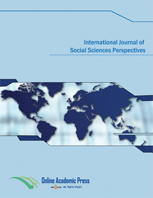Investigating Religious Beliefs, Consumption and Interreligious Dissimilarities and Similarities in Low Income Countries: A Mixed Research with Reference to Traditionalist, Christian and Muslim Consumers in Burkina Faso
DOI:
https://doi.org/10.33094/7.2017.2020.72.71.80Keywords:
Religiosity, Consumption, Behavior, Marketing, Christian, Muslim, Traditionalist.Abstract
The purpose of this research is to show the relationships between the degree of beliefs and the consumption behaviour and the reverse effect. A previous research has presented the results related to Muslim consumers; however, the present research originality or added value is that it includes Christian consumers and Traditionalist consumers living in the same context. This is a mixed method approach, that is to say a combination of a qualitative approach and a quantitative approach. Qualitative data was recorded with a voice recorder through semi-structured interviews with the respondents; and the qualitative data is transcribed by hand. The collection of quantitative data is performed using a questionnaire, and the analysis of the data was made with some softwares, especially three different types: Sphinx² -V5, Sphinx IQ and Sphinx IQ2. The results show that religiosity influences consumption behaviour with some interreligious differences and similarities, but also that consumption behaviour influences religiosity.




